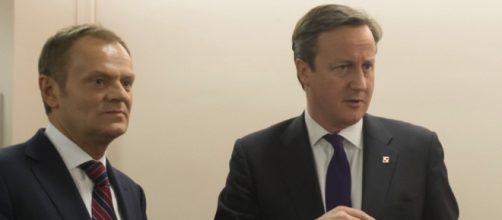The phony war is over. The countdown to Britain’s referendum on EU membership began in earnest today when the Prime Minister outlined his demands in a letter to EU Council President Donald Tusk.
As expected, there were four main demands, and David Cameron has said that if there is a successful resolution to these, he will campaign for continued membership.
Outlining his plans at a speech at Chatham House today he said the changes he was campaigning for were ‘substantial’.
The demands were:
- Mechanisms to protect Britain in the Eurozone
- EU needs to change and become more competitive
- Ever-closer union should not include UK
- Tackle the abuses in migration: restricting EU migrants’ access to benefits
However, some see the list of demands as trivial and not amounting to a wholesale reform of Britain’s relationship with Europe.
The main problem with more far-reaching reforms is that they would require Treaty change, which poses two related questions. Firstly, would all the other 27 countries agree (and some would require that any such changes are subject to referendums in their countries) and secondly, whether these could be achieved before the deadline of the end of 2017 for the British referendum.
Avoiding those complications, Cameron is going for a more modest package of proposals, some of which are less controversial than others.
On areas like competitiveness and protecting member states that are outside the Eurozone there is likely to be agreement.
However, on the issue of ‘ever-closer union’ (which was included in the Maastricht Treaty at the behest of the UK), this would require Treaty change.
But he said today that he would ask for a 'clear, legally-binding commitment' from EU leaders, perhaps avoiding the need for Treaty change. But the question is whether that in itself would be legal.
The issue of benefits to EU migrants could be more problematic as it could be ruled to be a form of discrimination.
A Summit is planned for December, and if there was agreement, the referendum could be held as early as next June.
Such a scenario would be welcomed by Chancellor George Osborne, as it would remove the issue of Europe from the domestic agenda and clear the way for him to campaign for the leadership of the Conservative Party. David Cameron has already declared that he will not stand as Prime Minister at the next General Election in 2020.
However, many commentators see the referendum issue as more about the Conservative Party’s fortunes. A large proportion of backbenchers are opposed to continued membership, and it has been a bone of contention for the party for decades. Having made the referendum a Manifesto commitment, Cameron is now at the mercy of the general public.
His demands will have to satisfy two audiences: his own party members and the wider public. His hope must be that appealing to the electorate will prove successful but it remains to be seen whether his package of reforms (and whether he achieves them) will convince them.
The initial reaction was predictable, with Eurosceptics pouring scorn on his speech. The Ukip MP Douglas Carswell said that the Prime Minister can no longer ‘pretend that he’s neutral’.

